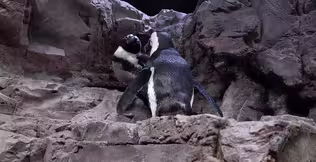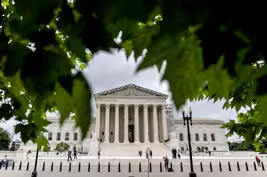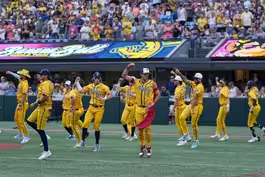
Marine Corps art exhibit honors triumphs and sacrifice
Clip: 7/4/2025 | 6m 48sVideo has Closed Captions
Marine Corps art exhibit marking 250 years honors its triumphs and sacrifice
The Marine Corps has opened a new art exhibit at its national museum documenting the service’s 250th anniversary. It’s called “250 Years of Dedication, Determination and Courage,” and it celebrates the Marines’ most famous moments. But it also features the trauma, terror and sacrifice of war. Nick Schifrin reports.
Problems playing video? | Closed Captioning Feedback
Problems playing video? | Closed Captioning Feedback
Major corporate funding for the PBS News Hour is provided by BDO, BNSF, Consumer Cellular, American Cruise Lines, and Raymond James. Funding for the PBS NewsHour Weekend is provided by...

Marine Corps art exhibit honors triumphs and sacrifice
Clip: 7/4/2025 | 6m 48sVideo has Closed Captions
The Marine Corps has opened a new art exhibit at its national museum documenting the service’s 250th anniversary. It’s called “250 Years of Dedication, Determination and Courage,” and it celebrates the Marines’ most famous moments. But it also features the trauma, terror and sacrifice of war. Nick Schifrin reports.
Problems playing video? | Closed Captioning Feedback
How to Watch PBS News Hour
PBS News Hour is available to stream on pbs.org and the free PBS App, available on iPhone, Apple TV, Android TV, Android smartphones, Amazon Fire TV, Amazon Fire Tablet, Roku, Samsung Smart TV, and Vizio.
Providing Support for PBS.org
Learn Moreabout PBS online sponsorshipJOHN YANG: On this Independence Day, the Marine Corps has opened a new art exhibit at its national museum documenting the service's 250th anniversary.
It's called 250 Years of Dedication, Determination and Courage.
It celebrates the Marine's most famous moments, but it also features the other side of war, trauma, terror and sacrifice.
Nick Schifrin went for a visit.
NICK SCHIFRIN: For combat artist and Marine Corps veteran Kristopher Battles, the brush is no less mighty than the sword.
KRISTOPHER BATTLES, Artist in Residence, National Museum of the Marine Corps: War is one of the oldest human endeavors.
It encompasses everything in humanity, the good, the bad, and the ugly.
And so we try not to edit out any of that.
So combat art tries to show everything as best we can.
NICK SCHIFRIN: Battles enlisted back in the '80s as a computer operator.
His true love was art.
And he rejoined after 9/11 to deploy to Iraq as a combat artist.
He's now at the Museum of the Marine Corps south of Washington, D.C., as its artist in residence.
KRISTOPHER BATTLES: There's something magical about the medium of the painted picture.
There's a very intimate engagement there that is very personal.
You can see the hand of the artist.
You can see how the paint was put down, what was depicted, how things were arranged.
And we're trying to bring maybe something noble and beautiful out of what is not always a beautiful or noble activity.
JOAN THOMAS, Curator, National Museum of the Marine Corps: One of the strengths of our collection is that we do not shy away from any subject.
NICK SCHIFRIN: Joan Thomas is the curator of the exhibit, more than 90 works of art that document 2.5 centuries of Marine Corps history from fighting the British in 1781 to fighting Seminoles in the 1840s to the 21st century Battles of Afghanistan and Iraq.
JOAN THOMAS: I look at art as a way of slowing down the scene.
It slows down the moment.
It captures the emotion.
When you look at a painting, if you have been there, the smell is all of a sudden -- it's a sensory experience, and it's more than just a quick snapshot.
It shapes it in a way that allows the viewer to step more closely into that experience.
NICK SCHIFRIN: Like at Iwo Jima in World War II.
NARRATOR: The Marines have to fight their way inland over bullet-swept coral.
NICK SCHIFRIN: That fighting in the Pacific was savage, island to island, as the U.S. sought to destroy Imperial Japan.
NARRATOR: This was the Japanese headquarters.
Enemy coast guns open up, and many of the landing craft get direct hits.
NICK SCHIFRIN: But amid the amphibious assaults, amid the brutality, moments that can be slowed down.
JOAN THOMAS: They haven't been afraid to go forward.
They have done everything we have asked them to do.
There's another painting depicting Down the Nets by Richard Gibney.
Not only did you have to crawl over and try to get down the rope and land in the vehicle that was going to take you onto the beach, and that's before you even fired a shot.
When you look at a painting like the Aftermath of Beirut or Field Hospital in An Hoa (ph), you realize the price people are paying.
There's a human price that's being paid.
NICK SCHIFRIN: An often personal price.
For so many, the pain and suffering of war comes home.
And post-traumatic stress, a fact of war since its inception, has only recently been treated as the wound that it is.
JOAN THOMAS: Sarah Rothschild's painting, self-portrait, What Happens There Doesn't Always Stay There, is her experience after she had gotten out of the Marine Corps trying to get her life back together, and she was looking at herself in the mirror as she was kind of falling apart.
We have one that shows a shock tent where you have exhausted Marines.
It's, you have been through too much, you have seen too much.
NICK SCHIFRIN: How were you trained as an artist?
Battles showed us around the exhibit.
He has nine paintings on display, most realist, but one looks and feels different.
KRISTOPHER BATTLES: This is a battle scene in Fallujah, so war can be chaotic and jumbled and frenetic and dark and light.
NICK SCHIFRIN: In November 2004, Marines fought Iraqi insurgents to retake Fallujah west of Baghdad.
The weeks-long operation became the Marines' largest urban battle since Vietnam and among the deadliest.
It was street to street and house to house.
KRISTOPHER BATTLES: You're coming into the dark from the light and you can't see well, and there's rubble and smoke and dust.
And so I was trying to show that jumbled chaos and that unknown.
I was emoting on the canvas in a way.
I was -- palette knife, and I was even using my fingers.
Some detail is shown.
Some is not.
Certain things are blurry and out of focus.
NICK SCHIFRIN: Battles served in Mosul, not Fallujah, so he interviewed Marines who'd fought there to do what Marine combat artists have done for more than 80 years, putting Marines' words and memories to Canvas.
KRISTOPHER BATTLES: I wanted to somehow be authentic, even though I wasn't in this hell house, so to speak.
NICK SCHIFRIN: Authentic for veterans like former Marine Sergeant Pakee Fang.
PAKEE FANG, U.S. Marine Veteran: The Marines have to go in and do the dirty work.
NICK SCHIFRIN: Fang was Chinese-born, raised in New York and enlisted in the Marines at 17.
He served in Iraq and was honorably discharged after being injured while patrolling for roadside bombs.
PAKEE FANG: The legacy of being a Marine, like, is extremely important to me.
And I want to showcase that, like, to my family and make them kind of, like, understand the sacrifice that took place throughout the generations.
NICK SCHIFRIN: Does showing your family this art, does it help you communicate that to your family?
PAKEE FANG: Yes.
Yes, it brings me comfort, some type of closure, especially when you have people that come back home without limbs, without their family, and kind of, like, keep that perspective in me, like, as I go on with my life.
NICK SCHIFRIN: Life does go on, but war and its legacy remains framed for everyone who fought.
For the "PBS News Hour," I'm Nick Schifrin in Quantico, Virginia.
Aquarium creates senior sanctuary for aging penguins
Video has Closed Captions
Clip: 7/4/2025 | 5m 54s | Aquarium creates senior sanctuary for aging penguins (5m 54s)
Brooks and Capehart on Trump's total control over Washington
Video has Closed Captions
Clip: 7/4/2025 | 12m 7s | Brooks and Capehart on Trump's total control over Washington (12m 7s)
The long-term risks as extreme heat becomes a new normal
Video has Closed Captions
Clip: 7/4/2025 | 8m 11s | The long-term health risks as extreme heat becomes a new normal (8m 11s)
News Wrap: Trump signs One Big, Beautiful Bill Act into law
Video has Closed Captions
Clip: 7/4/2025 | 5m 39s | News Wrap: Trump signs his One Big, Beautiful Bill Act into law (5m 39s)
Supreme Court rulings could have far-reaching consequences
Video has Closed Captions
Clip: 7/4/2025 | 7m 45s | A look at rulings from the Supreme Court term that could have far-reaching consequences (7m 45s)
Why fans are going bananas for Banana Ball
Video has Closed Captions
Clip: 7/4/2025 | 4m 58s | Why fans are going bananas for Banana Ball (4m 58s)
Providing Support for PBS.org
Learn Moreabout PBS online sponsorshipSupport for PBS provided by:
Major corporate funding for the PBS News Hour is provided by BDO, BNSF, Consumer Cellular, American Cruise Lines, and Raymond James. Funding for the PBS NewsHour Weekend is provided by...

















